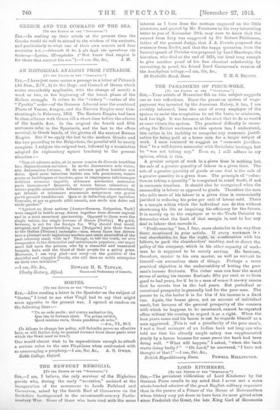THE PARADOXES OF PIECE-WORK. [ To THU ,1 . 1; DITOU OF tea
" SPECTATo R."
Sin,—Your article of November 6th on this subject suggests one or two reflections. Since the premium system of wage- payment was invented by the American Halsey, it has, I am credibly informed, been the care of every employer of the system to resist the temptation to set the basic, or minimum,. task too high. It was foreseen at the start that to do so would at once vitiate the system. The practical difficulty in recon- ciling the 'British workman to this system has, I understand, lain rather in his inability to recognize any economic justifi- cation for being paid at a lower rate for it larger output of work. I once ventured to suggest an " economic justifica- tion " to a well-known economist with Socialistic leanings, but he "" was not taking any." Even so, I still adhere to my opinion, which is this.
A greater output of work in a given time is nothing but the sale of a greater quantity of labour in a given time. The sale of a greater quantity of goods at one deal ie the sale of a greater quantity in a given time. The principle of "reduc- tion on taking a quantity" is recognized in retail trade, if not in economic treatises. It should also he recognized when the commodity is labour as opposed to gouda. Therefore the man who sells more of his labour in a given time is economically justified in reducing his price per unit of 'labour sold. There is a margin within which the individual can do this without shortening his life or impairing his efficiency for the future. It is merely up to the employer or to the Trade Unionist to determine what the limit of that margin is, and to bar any deal in labour that exceeds it, "Profit-sharing " has, I fear, more obstacles in its way than those mentioned in your article. If every workman is & real shareholder, he has the right, in oembinatioa with his fellows, to pack the shareholders' meeting, and so direct the
policy of the company, which in his other capacity of work- man he is supposed to be merely serving. He becomes, therefore, master to his own master, as well as servant to himself—an anomalous state of things, Perhaps a more practical objection is the undesirability of letting the poor man's ineome fluctuate. The richer man Can bear the moral stress of seeing his income fluctuate fifty per cent. or so from good to bad years, for if he is a man of sense it merely means that he invests less in the bad years. But periodical or occasional prosperity is generally bad for the poor man. The poorer he is, the better it is for him if his income is a fixed one, Again, the bonus given, not on account of individual merit, but because of the general prosperity of the concern with which he -happens to be associated, cannot be repeated often without his coming to regard it as a right. When the lean years come and his bonus is cut he regards himself as a man aggrieved. This is not a peculiarity of the poor man's. I met a local manager of an Indian bank not long ago who told me that his already ample salary was supplemented yearly by a bonus because for some years the bank had been doing well. " What will happen," I asked, "when the bank starts doing badly P " " Oh Lord," he answered, "I have not thought of that !"-1 am, Sir, &e., British _Expeditionary Force. POWE
LL Mfl,LINCTON.






































 Previous page
Previous page